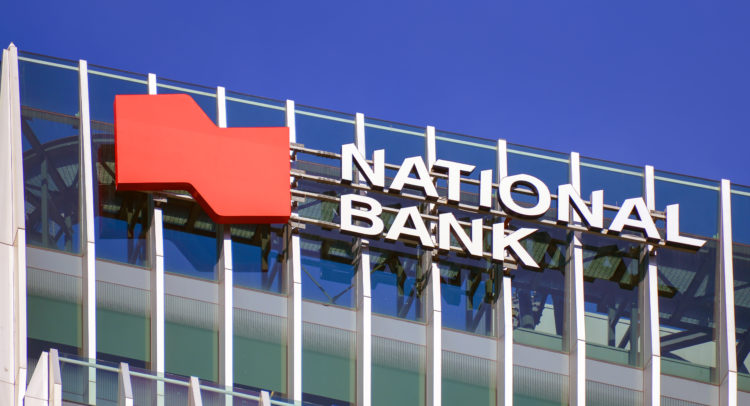National Bank of Canada (NA) has announced that it is doing away with online trading fees through its direct investing platform, National Bank Direct Brokerage.
Elevate Your Investing Strategy:
- Take advantage of TipRanks Premium at 50% off! Unlock powerful investing tools, advanced data, and expert analyst insights to help you invest with confidence.
By having the “most competitive online brokerage fee structure on the Canadian market” offered through a Schedule 1 bank, National will be among Wealthsimple as the only Canadian platforms offering zero trading fees. I am neutral on the stock. (See NA stock charts on TipRanks)
Prior to the announcement, National charged a commission of C$6.95 per self-directed trade, which was already at the lower end of the big-bank pricing spectrum. The new pricing structure applies to buying and selling stocks and ETFs listed on North American exchanges, in registered and non-registered accounts, with no minimums.
“The self-directed investing sector is constantly evolving, and it’s important for us to keep innovating and not rely on the status quo, for the benefit of our clients and all investors across the country,” said Claude-Frédéric Robert, president of National Bank Direct Brokerage. “That’s why we’re looking for new ways to equip and support Canadian investors, and this new $0 pricing is another step in our efforts.”
National is the sixth-largest commercial bank in Canada, with a market cap over C$33 billion. It is headquartered in Montreal, and has 2.4 million personal clients.
Zero-Commission Platforms
As zero-commission trading platforms gained popularity during the COVID-19 pandemic. Driven by retail investors, trading platforms like Robinhood Markets (HOOD) saw an opportunity to gain significant market share.
Commission-less trading platforms are known to make money by routing their users’ orders through market makers, as well as other means. This process is called payment for order flow (PFOF). Platforms that use PFOF receive a small payment, usually fractions of a penny per share to direct orders to a particular market maker. This has proven to be a significant source of revenue for companies that process a large number of daily orders.
Traditionally, discount brokers have generated a large portion of their revenues from trading fees, but that model is rapidly changing. National will now rely on revenues generated through lending money to clients to buy stocks (margin loans), foreign exchange fees, interest on client cash balances, and various account fees. A small amount of revenue will be associated with PFOF on some U.S. listed stocks.
Pressure on Canadian Bank Peers
The move puts pressure on the rest of the Canadian banks, as they have already been ceding market share to fintech companies offering no-fee structures, as well as modern digital platforms that appeal to the younger demographic.
Trading fees have been slowly grinding down for some time across Canada and the U.S., but Robinhood took it to another level in 2013, launching zero-commission trades. Others, such as Charles Swab (SCHW) followed suit in 2019, eliminating trading commissions.
No platform in Canada offered zero commissions until Wealthsimple hit the market with its Wealthsimple Trade app in March of 2019.
The other Big Five banks in Canada charge a commission for self-directed orders, ranging between C$4.99 per trade to as high as C$9.99 per trade for equities. The big banks in Canada typically move slowly when it comes to lowering fees in general; the last significant move came from RBC Direct Investing seven years ago, when it introduced a flat commission of C$9.95 to trade stocks.
Bottom Line
As Canadian banks report their quarterly earnings, it will be interesting to see if they address the issue of trading commissions on their calls.
In order to stay competitive with the market, Canadian banks must respond quickly, or risk losing more of their self-directed business to tech-savvy platforms. The move from National could be expected to cause some ripple effects throughout the Canadian discount-broker landscape, ultimately benefitting retail investors.
What Analysts are Saying about NA Stock
From Wall Street analysts, NA earns a Moderate Buy consensus rating, based on five Buy ratings and five Hold ratings. Additionally, the average NA price target of C$102.95 puts the stock’s upside potential at 2.8%.

Disclosure: On the date of publication, Sean Tascatan had a position in HOOD stock.
Disclaimer: The information contained in this article represents the views and opinion of the writer only, and not the views or opinion of TipRanks or its affiliates, and should be considered for informational purposes only. TipRanks makes no warranties about the completeness, accuracy or reliability of such information. Nothing in this article should be taken as a recommendation or solicitation to purchase or sell securities. Nothing in the article constitutes legal, professional, investment and/or financial advice and/or takes into account the specific needs and/or requirements of an individual, nor does any information in the article constitute a comprehensive or complete statement of the matters or subject discussed therein. TipRanks and its affiliates disclaim all liability or responsibility with respect to the content of the article, and any action taken upon the information in the article is at your own and sole risk. The link to this article does not constitute an endorsement or recommendation by TipRanks or its affiliates. Past performance is not indicative of future results, prices or performance.
















